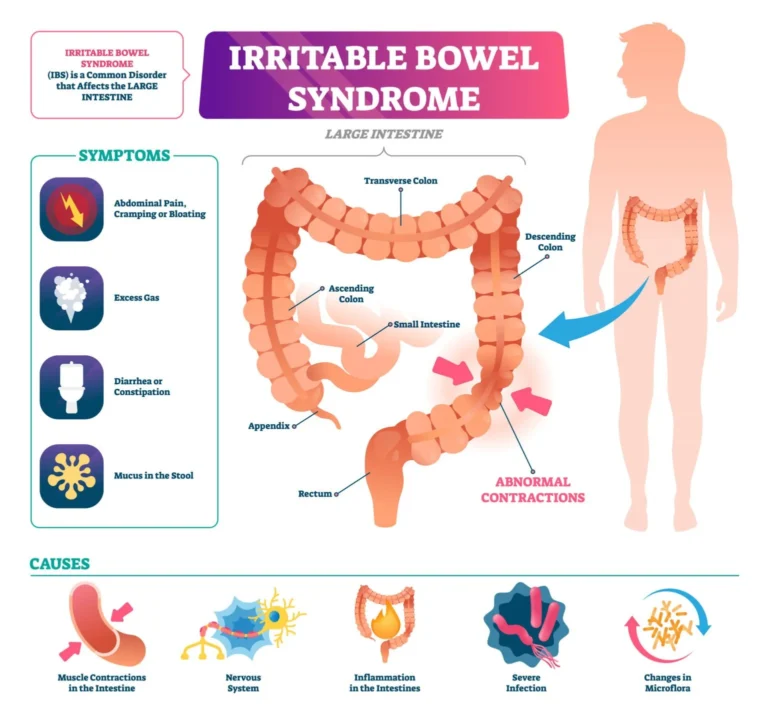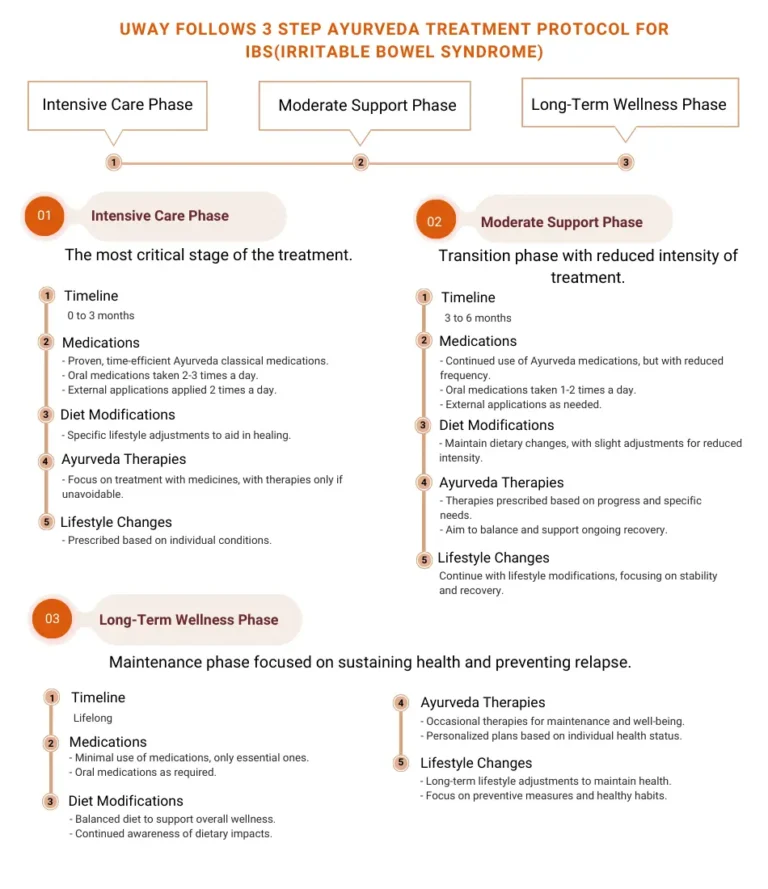Ayurveda Treatment for Irritable Bowel Syndrome (IBS)
Irritable Bowel Syndrome (IBS), referred to as ‘Grahani’ in Ayurveda, is a functional disorder of the digestive system affecting the stomach and intestines (the gastrointestinal tract). It is Characterised by chronic abdominal pain, discomfort, bloating, and an alteration of bowel habits. It can be lifelong and can be managed with the right treatment and Ayurveda approach.
Did you know that 7 – 10 % of people have Irritable Bowel Syndrome (IBS) worldwide and it is 1.5 times more prevalent in younger women than in men?
Navigating Irritable Bowel Syndrome (IBS) in the workplace can be challenging, especially since IBS is a common condition that affects the colon (large intestine). It presents as a group of symptoms, including repeated abdominal pain and changes in bowel movements—these may manifest as diarrhea, constipation, or both. Importantly, IBS does not cause visible signs of damage or disease in the digestive tract. While it is not life-threatening, it can be highly uncomfortable. Ayurveda treatment for irritable bowel syndrome offers natural remedies that focus on balancing the body’s energies and improving digestive health.
Scientific studies suggest that managing stress effectively can help prevent or alleviate IBS symptoms. Factors such as stress, anxiety, infections, medications, excessive alcohol or caffeine consumption, and ongoing intolerance to lactose or gluten often contribute to irritable bowel syndrome. Ayurveda treatment for irritable bowel syndrome can include dietary adjustments, herbal supplements, and lifestyle changes aimed at reducing stress and enhancing overall well-being.
Symptoms of Irritable Bowel Syndrome (IBS):
Symptoms of IBS can appear frequently, or, they may occur during flare-ups. It includes
- Abdominal pain, discomfort, or cramps
- Bloating and excess gas
- Diarrhea, constipation, or alternating between the two
- Flatulence
- Regurgitation
- Belching
- Nausea
- Mucus in your poop (may look whitish)
- Feeling like you’re unable to empty your bowels after pooping.

Types of IBS
There are three types of irritable bowel syndrome, or IBS. They include:
- IBS with Constipation (IBS-C): You may often have hard stools and abdominal discomfort.
- IBS with Diarrhoea (IBS-D): You may often have loose stools and abdominal discomfort.
- IBS with Mixed Bowel Habits (IBS-M): You may have both hard, lumpy bowel movements and loose, watery movements on the same day, with abdominal discomfort.
Understanding the Causes of IBS
The exact cause of IBS is not known. Factors that appear to play a role include:
- Brain-gut dysfunction: IBS may arise from how the gut nerves communicate with the brain, or how the brain processes that information. Dysfunction in the interactions between the brain and the intestines can cause the body to overreact to changes that occur usually in the digestive process and can cause pain, intestinal spasms, and an irregular pattern of bowel movements.
- Gut Infection: Repeated gastrointestinal infections can damage the intestinal lining and lead to IBS.
- Abnormal contractions of the GI muscles: Usually when food or fluids enter your GI tract, nerves trigger the muscles to initiate a series of wave-like contractions. However, contractions which are stronger and last longer than usual can cause gas, bloating and diarrhea. Also, weak contractions can slow food passage and lead to hard, dry stools.
- Severe infection: IBS can develop after severe gastroenteritis (a viral or bacterial infection).
- Bacterial overgrowth: IBS might also be related to an overgrowth of bacteria in the small intestines.
- Poor Eating Habits: Irregular eating schedules and consumption of unhealthy foods disrupt digestion.
- Sedentary Lifestyle: Lack of physical activity is linked to worsening digestive disorders, including IBS.
- Stress and Anxiety: These psychological factors significantly affect the immune system and exacerbate symptoms.
- Changes in gut microbes: Imbalances in bacteria, fungi, and viruses, which typically reside in the intestines and play a key role in health can cause intestinal inflammation and pain.
Who is at risk for developing Irritable Bowel Syndrome (IBS)?
Certain factors seem to make people more likely to have IBS such as:
- Age- IBS can affect people of all ages, but it’s more likely to occur in people under the age 50.
- Being female- IBS is more common among women. About twice as many women as men have the condition
- Having a family history of Irritable Bowel Syndrome- Genetics may make some people more likely to develop IBS.
- Emotional aspects- Stress, anxiety, and depression tend to worsen IBS symptoms.
- Food intolerances or sensitivities- Certain foods such as dairy products, wheat, citrus fruits, beans, carbonated drinks, and alcohol can trigger IBS symptoms.
Ayurveda Treatment for Irritable Bowel Syndrome at UWAY:

IBS symptoms can be triggered by stress, dietary habits, or other health conditions. It’s essential to understand and address the root cause before beginning any treatment.
For mild cases, our doctors may recommend Ayurvedic formulations, such as herbal powders and decoctions, to soothe digestive issues and relieve symptoms.
For chronic IBS, Uway Health follows a structured Ayurvedic approach:
1. Dietary Modifications: Our treatment emphasizes a balanced diet tailored to reduce triggers, such as high-FODMAP foods, while promoting gut-friendly foods like fiber-rich grains and vegetables.
2. Lifestyle Adjustments: Based on the patient’s condition, Uway doctors may advise practices like yoga and meditation, which are known to reduce stress—an IBS trigger.
UWAY doctors prescribe time-tested Ayurvedic medicines sourced from India’s top manufacturers. Each patient receives a unique prescription based on their specific symptoms and dosha imbalances.
3. Classical Ayurvedic Medicines: Ayurveda also emphasizes the importance of mind-body practices like yoga and meditation to relieve IBS. Certain yoga poses, such as Malasana (Garland Pose), Ardha Matsyendrasana (Seated Twist), Adho Mukha Svanasana (Downward Dog), Pawanmuktasana (Wind-Relieving Pose), Bhujangasana (Cobra Pose), Dhanurasana (Bow Pose), improve digestion and reduce stress. Meditation, which strengthens the gut-mind connection, is equally crucial for long-term relief.
In more severe cases, Panchakarma therapies are suggested to detoxify and restore digestive balance. A holistic approach like this not only provides immediate symptom relief but also supports long-term gut health for effective IBS management.
FAQ's:
- Abdominal pain, discomfort, or cramps
- Bloating
- Diarrhea, constipation, or alternating between the two
- Flatulence
Since IBS is a functional, physiological disorder, stress levels and psychological well-being of a person impact the overall outcome of the treatment. Hence, along with the medications, stress management techniques that include both mind and body interventions, such as yoga, have been adopted for long-term management.
At UWAY, our doctors prescribe only proven medicines from well-established and reputed ayurvedic medicine manufacturers. However, just like certain foods do not always agree with everyone, few ayurvedic medicines may cause mild side effects in some patients. This is very rare though. In case you notice any such issue you can always talk to your consulting doctor or our medical team.
Ayurveda treatment can be effective for many people with IBS, helping to reduce symptoms and improve digestive health by addressing the root causes and imbalances in the body.
Quick, Convenient & Safe Healthcare
chronic conditions in the last 20 years.
How we work?
Chat with Our Medical Advisor Online
Book an Appointment with Doctor
Consult with our Experienced Doctor Online
Get Doorstep Deliver of Medicines
Get Free Assistance with UWAY
Continuous Support By Medical Advisor








